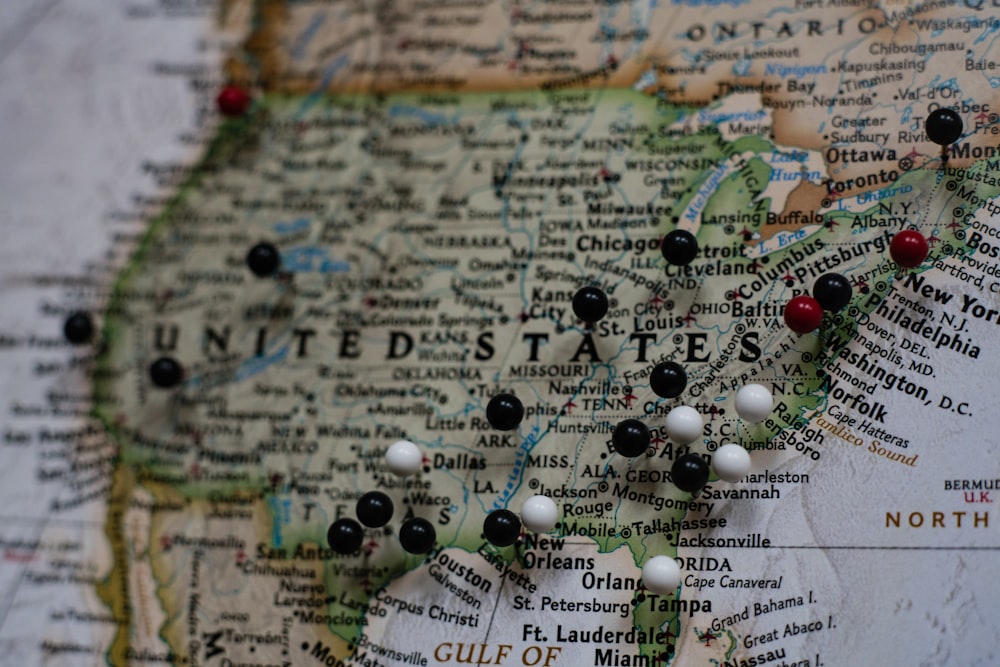Starting a business is an exciting endeavor filled with endless possibilities. However, choosing the right state to launch your startup is a crucial decision that can greatly impact your chances of success. Each state offers a unique set of advantages and disadvantages, making it essential to evaluate various factors before making this important choice. In this comprehensive guide, we will explore the best states to start a business, considering key elements such as financing opportunities, tax systems, workforce availability, costs, and growth trends. By delving into these factors, you will gain valuable insights to help you unlock opportunities and thrive in your entrepreneurial journey.
Factors That Define the Best State for Starting a Business
Determining the best state to start a business involves evaluating a combination of factors that contribute to a favorable business environment. By considering key aspects such as financing opportunities, tax systems, workforce availability, costs, and growth trends, you can make an informed decision that aligns with your business goals and objectives. Let’s explore each of these factors in detail.
1. Financing Opportunities: Fueling Your Entrepreneurial Dreams
Starting a business requires access to capital, as most entrepreneurs don’t have the necessary funds to fully bootstrap their ventures. Therefore, evaluating financing opportunities is crucial when determining the best state to start a business. Various sources of funding, such as personal savings, business loans, credit cards, crowdfunding, and venture capital, play a significant role in fueling your entrepreneurial dreams.
While financing options are available nationwide, some states offer more favorable conditions for obtaining funding. According to a WalletHub study, the best states for financing opportunities are South Dakota, North Dakota, and Utah. These states provide accessible financing options, making it easier for entrepreneurs to secure the necessary capital to start and grow their businesses.
On the other hand, states like New Mexico, Wyoming, and Oregon rank lower in terms of financing opportunities. Entrepreneurs in these states may face more challenges when seeking funding for their startups. It’s important to consider the financing landscape of each state and choose one that aligns with your specific funding needs.
2. Tax Systems: Navigating the Complexities
Tax systems play a critical role in the overall business environment of a state. Business-friendly tax systems can significantly impact your bottom line and contribute to a more favorable operating environment. When evaluating the best state to start a business, it’s important to consider the tax implications for both individuals and corporations.
States with attractive tax systems typically have lower or no corporate income tax, individual income tax, and sales tax rates. Simplified tax structures and transparent regulations facilitate compliance and reduce administrative burdens for businesses.
Wyoming, South Dakota, and Alaska emerge as the best states for tax systems, offering favorable tax rates and simplified tax structures. These states provide a business-friendly environment with lower tax burdens, allowing entrepreneurs to allocate more resources to their core business operations.
Conversely, New Jersey, New York, and California have more complex tax systems and higher tax rates, potentially placing a heavier burden on businesses operating within their borders. When choosing a state to start a business, it’s important to carefully evaluate the tax implications and consider the impact on your profitability.
3. Workforce: Building the Foundation for Success
The availability of a skilled and qualified workforce is essential for the success of any business. When considering the best state to start a business, it’s crucial to evaluate the labor market and determine whether it can meet your business’s specific needs.
States with a high availability of human capital provide a fertile ground for businesses to thrive. Nevada, California, and Hawaii are among the states with the highest availability of human capital, offering a diverse pool of skilled workers that businesses can tap into.
In addition to the overall availability of labor, some industries require specific skill sets and educational backgrounds. States like Massachusetts, Colorado, and Maryland boast the most educated populations, making them ideal for businesses that require specialized knowledge and expertise.
When starting your business, it’s essential to estimate your workforce needs and identify states that can fulfill those requirements. Finding the right balance between labor availability, skills, and education is crucial to building a strong foundation for your business’s success.
4. Costs: Balancing the Budget
Cost considerations are paramount when starting a business. Evaluating the costs associated with office space, labor, and living expenses can provide valuable insights into the financial implications of launching your startup in different states.
The cost of office space varies significantly across different states. Iowa, Maine, and South Dakota emerge as the states with the cheapest office spaces, offering cost-effective solutions for businesses looking to establish a physical presence.
Labor costs also play a significant role in determining the overall cost of doing business. Mississippi, West Virginia, and South Dakota are the states with the lowest annual mean wages, making them attractive options for businesses seeking to minimize labor expenses.
In addition to office space and labor costs, the cost of living is another crucial factor to consider. Ohio, Oklahoma, and Michigan rank among the most affordable states in terms of cost of living, providing entrepreneurs with a more favorable environment for their personal finances.
When evaluating the costs of starting a business, it’s important to strike a balance between affordability and the resources and opportunities available in each state. Consider your budgetary constraints and align them with the financial realities and potential return on investment in each location.
5. Growth Trends: Setting Your Business on the Path to Success
Business growth is a primary objective for most entrepreneurs. While growth potential exists in every state, some states offer more favorable conditions for businesses to thrive. Evaluating growth trends can provide valuable insights into the opportunities and challenges your business may face in different locations.
States with a consistently expanding customer base, increasing profits, and overall business growth create an environment conducive to entrepreneurial success. Idaho, Utah, and Nevada rank among the states with the highest average growth in the number of small businesses, signaling a vibrant business landscape and promising opportunities for startups.
Conversely, states like Kentucky, North Dakota, and Missouri experience lower average growth in the number of small businesses, indicating potential challenges and a more competitive business environment.
When considering the growth potential of a state, it’s important to assess the specific industry landscape and identify sectors that align with your business’s strengths and capabilities. By capitalizing on growth trends and positioning your business strategically, you can maximize your chances of success.
The Top 10 Best States for Starting a Business
Now that we have explored the key factors that define the best states for starting a business, it’s time to reveal the top 10 states that offer favorable conditions for entrepreneurs. These states, ranked based on a comprehensive evaluation of financing opportunities, tax systems, workforce availability, costs, and growth trends, represent the most promising locations to launch your startup.
- Texas: The Lone Star State emerges as the best overall state to start a business, offering a business-friendly climate, no personal or corporate state income taxes, and a large pool of labor.
- Utah: Known for its fast-growing economy, access to venture capital, and small-business-friendly tax environment, Utah ranks second, making it an attractive destination for entrepreneurs.
- Montana: With its startup-friendly policies, zero state sales tax, and reasonable labor costs, Montana comes in third, providing a supportive environment for new businesses.
- Georgia: Georgia’s well-developed infrastructure, strong economy, and low state minimum hourly wage rates make it the fourth-best state for starting a business.
- Florida: Home to four of the most small business-friendly cities in the country, Florida ranks fifth, offering no state income tax for individuals and a favorable tax environment for businesses.
- California: Known for its innovation and access to capital, California secures the sixth spot, despite its higher cost of doing business and corporate tax rate.
- Oklahoma: With the lowest cost of doing business in the country and a high business survival rate, Oklahoma ranks seventh, making it an attractive option for entrepreneurs.
- Idaho: Boasting a strong state economy, skilled labor, and low risk of natural disasters, Idaho takes the eighth spot, particularly attractive for businesses with real estate needs.
- North Carolina: With its robust economy, strong workforce, and low compliance requirements, North Carolina ranks ninth, offering a practical choice for starting an LLC.
- Delaware: While not the most small-business-friendly state overall, Delaware’s privacy protection and asset protection make it an appealing choice for entrepreneurs.
These top 10 states provide a range of opportunities for entrepreneurs, each with its unique advantages and considerations. By aligning your business goals and needs with the specific strengths of these states, you can position your startup for success.
The Worst States for Starting a Business: Considerations and Challenges
While we have explored the best states for starting a business, it’s equally important to understand the states that present more challenges and potentially hinder entrepreneurial success. These states, ranked based on the same evaluation criteria, highlight the considerations and drawbacks entrepreneurs may face when launching a business in less favorable environments.
- New York: With high costs of living and taxes, New York presents challenges for entrepreneurs, although its high risk often comes with high reward.
- Vermont: Aging workforce, high tax rates, and limited financing options make Vermont a less attractive choice for starting a business.
- New Jersey: Known for its higher tax rates and high cost of doing business, New Jersey poses challenges for entrepreneurs seeking to establish their startups.
- Hawaii: While beautiful, Hawaii presents difficulties due to a high cost of doing business, limited skilled labor, and higher tax rates.
- Rhode Island: As the worst state to start a business, Rhode Island’s challenges include an aging infrastructure, expensive real estate, high labor wages, and a poor economy.
Entrepreneurs considering these states should carefully evaluate the specific challenges and weigh them against the potential opportunities. While these states may present hurdles, success is not impossible with the right strategies, resources, and determination.
Costs: Balancing the Budget
When starting a business, it’s essential to consider the associated costs, which can significantly vary from one state to another. Let’s break down the costs in our top 10 states for business, focusing on office space, labor, and living expenses.
Office Space Costs
- Iowa: Average office space cost is around $16.50 per square foot per year.
- Maine: Slightly higher, with an average cost of $18 per square foot per year.
- South Dakota: Offers some of the cheapest options at approximately $15.30 per square foot per year.
Comparing these to a more expensive state like California, where office space can exceed $36 per square foot per year, shows significant savings.
Labor Costs
- Mississippi: Has one of the lowest average annual salaries at around $37,000.
- West Virginia: Similar, with average salaries at approximately $38,000.
- South Dakota: Offers competitive labor costs with an average salary of about $39,500.
In contrast, states like California have an average annual salary of over $59,000, impacting your labor budget.
Living Expenses
- Ohio: The cost of living index is around 90.8, making it lower than the national average.
- Oklahoma: Even more affordable, with a cost of living index of 87.
- Michigan: Offers a cost of living index of 88.9.
These figures are considerably lower than states like New York or California, where the cost of living index can climb above 120.
Balancing Costs with Business Needs
Choosing the right state involves balancing these costs against what the state offers in return. For example, a higher cost of living might be offset by better business opportunities or a more skilled workforce.
Consider your business’s specific needs:
- If lower overheads are crucial, states like South Dakota or Iowa might be appealing.
- If access to a skilled workforce is more important, higher labor costs in a state like California could be justified.
Remember, each state’s costs can impact your business differently. Assess all factors, from office rental to salary budgets, against the backdrop of what each state can offer your business in terms of growth, market access, and quality of life. This comprehensive approach will help you make an informed decision tailored to your business’s unique needs and goals.
Future Outlook and Trends
Understanding the future outlook and trends in various states is crucial for your business’s long-term success. Let’s dive into the expected trends in our top 10 states for starting a business, focusing on economic growth, industry developments, and demographic changes.
Texas: The Lone Star State is expected to continue its economic boom, with significant growth in technology, healthcare, and green energy sectors. Texas’s population is rapidly growing, making it a larger market for new businesses. However, be mindful of increasing competition and real estate prices.
Utah: Utah’s tech sector, dubbed “Silicon Slopes,” is on the rise, attracting tech companies and startups. The state’s strong focus on education and tech training means a growing talent pool. Watch out for rising costs as the state becomes more popular.
Montana: Montana is becoming a hub for outdoor and adventure-related businesses. Its tourism industry is booming, offering opportunities in hospitality, retail, and service sectors. However, seasonal fluctuations can affect business stability.
Georgia: Georgia’s diverse economy, with strong sectors in agriculture, film, and fintech, continues to grow. Atlanta, in particular, is becoming a tech hub. Be prepared for increasing urbanization and traffic, which could affect logistics and commuting times.
Florida: Florida’s population is growing, especially among retirees, boosting healthcare, real estate, and service industries. Its tourism sector is also bouncing back. Keep an eye on hurricane season and climate change, which could impact insurance and property costs.
California: Despite high costs, California remains a leader in technology, entertainment, and green energy. However, businesses should plan for stricter environmental regulations and ongoing water scarcity issues, which could affect operational costs.
Oklahoma: Oklahoma’s economy is diversifying beyond oil and gas, with growth in sectors like aerospace, agriculture, and biotechnology. The cost of living remains low, but businesses should consider the state’s susceptibility to extreme weather.
Idaho: Idaho’s tech and manufacturing sectors are expanding, driven by an influx of new residents and businesses. However, the state faces challenges such as infrastructure strain and higher housing costs due to rapid growth.
North Carolina: North Carolina is seeing growth in tech, banking, and pharmaceutical industries. The state’s research triangle (Raleigh-Durham-Chapel Hill) is a hotbed for innovation. However, be aware of competition for talent and rising living costs.
Delaware: Known for its business-friendly laws, Delaware continues to attract corporations. However, businesses should stay informed about changes in tax laws and regulations that could affect the corporate-friendly climate.
Trends to Watch
- Remote Work: As remote work becomes more common, states with a lower cost of living and high quality of life may become more attractive.
- Green Energy: States investing in renewable energy and sustainability initiatives are likely to attract new businesses and talent.
- Tech Advancements: States with growing tech sectors and innovation hubs are poised for growth, offering opportunities for startups.
When planning your business’s future, consider these trends and how they align with your goals and values. Each state has unique opportunities and challenges, so choose one that matches your business’s direction and will support its growth in the coming years.
Conclusion: Unlocking Opportunities for Success
Choosing the best state to start a business is a critical decision that can shape the trajectory of your entrepreneurial journey. By carefully evaluating factors such as financing opportunities, tax systems, workforce availability, costs, and growth trends, you can make an informed choice that aligns with your business goals and objectives.
Each state offers a unique set of advantages and challenges, requiring entrepreneurs to strike a balance between their specific needs and the opportunities available. Whether you choose Texas for its business-friendly climate, Utah for its access to venture capital, or Montana for its startup-friendly policies, each state presents its own set of opportunities and considerations.
Remember, success in entrepreneurship requires a combination of factors, including careful planning, market research, a solid business model, and perseverance. By leveraging the insights gained from evaluating the best states for starting a business, you can unlock opportunities and set your business on the path to success.
Frequently Asked Questions
What state is best to open a business in?
The best state to open a business can vary based on your industry and needs. However, Delaware, Wyoming, and Nevada are often top choices due to their business-friendly laws and tax policies.
What state is the cheapest to start a business?
The cheapest state to start a business can depend on various factors, including taxes and filing fees. States like Wyoming, Alaska, and South Dakota are known for low costs.
What is the best state in the US for startups?
California, New York, and Massachusetts are typically considered the best states for startups, offering vibrant ecosystems, funding opportunities, and networking.
What is the most business-friendly state?
Texas, Florida, and Utah are often cited as the most business-friendly states, thanks to their low taxes, regulatory environment, and supportive business climates.
What state has the lowest LLC tax?
States like South Dakota, Wyoming, and Alaska have no state income tax, which can be beneficial for LLCs.
What state has the cheapest LLC tax?
Wyoming, Nevada, and South Dakota offer low or no LLC taxes, making them attractive for small business owners.
What state pays entrepreneurs the most?
Salaries for entrepreneurs can vary widely, but states like California, Massachusetts, and New York typically offer higher average pay.
Where is the best place for startups?
Silicon Valley in California is renowned worldwide for being a leading hub for startups, offering immense resources and networking opportunities.
Which US city has the most startups?
San Francisco, New York City, and Austin are among the US cities with the most startups, each providing unique advantages for new businesses.
Featured Image Credit: Photo by Domino; Unsplash – Thank you!































